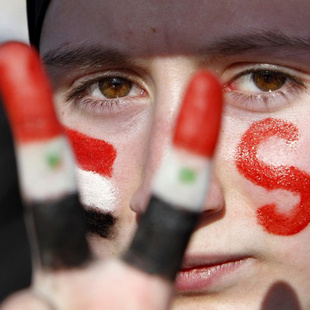Syrian Crisis: Over؟

MSD: Syria is in a critical phase. The opposition gathering held on Monday can hint that the Syrian regime is gradually grasping a correct understanding of the developments, and this is what its benevolent neighbors, like Turkey, had demanded of Bashar Assad. The return of the military and security forces to their barracks and a democratic transition of power are the two basic demands of the opposition. Reform in its true sense will not take place unless the circulation of the elite through democratic channels is possible. The problem with the one-party regime of Syria was that it did not comprehend the crisis and denied its existence. If the opposition congregation succeeds in creating a common language between the state and the people, it has taken a giant leap. At the same time, the bloodshed has lost its intensity and that can b good news, if it continues.
IRD: The situation is quite stormy at the borders of Syria and Turkey. How do you see the prospects of bilateral ties between Syria and its northern neighbors?
MSD: The influx of Syrians fleeing into Turkey’s territory in fear of the army’s retaliation has made bilateral ties between Damascus and Ankara quite tense. Of course, as reports indicate, a number of refugees have returned to Syria after the army’s operation in northern Syria calmed down. The relations between Turkey and Syria depend on the refugees’ perceptions of the situation inside their country. The ratio of murdered citizens to demonstrators is decreasing, mostly due to pressure from the international community. Conversely, the sense of security is increasing. The regime should now take action and limit the unrestricted authority of the army and security forces, if it wants to rebuild its international image.
IRD: In general, how do you see the prospect of real change in Syria? Will Bashar Assad keep his throne with fundamental reforms, or will a new political system emerge?
MSD: What the Syrian regime is currently propagating is that it has managed to solve the problem in its preferred fashion. Bashar Assad has embarked on cosmetic reforms, but if he refuses to yield to the citizens’ main demand which is a democratic power transition –the fulcrum of reform- it’s like nothing has changed. Many Syrians don’t want their country to turn into another Libya and face massacres and foreign intervention. The Libyan experience encourages them to seek an internal solution. The implications of foreign interference in the country will be deep. Knowing this, the Syrian opposition is ready to embrace any functional domestic approach. I think Turkey also backs a domestic solution. If the regime starts a dialogue with a realistic moderate opposition and abstains from detaining and imprisoning them, efficient solutions will be introduced. Otherwise, pessimism will return to the opposition if the Syrian government does not initiate substantial reforms until the crisis abates.
Mohammad Shari’ati Dehaqan is former cultural attaché to Iran's embassy in Syria and an advisor to Mohammad Khatami.

